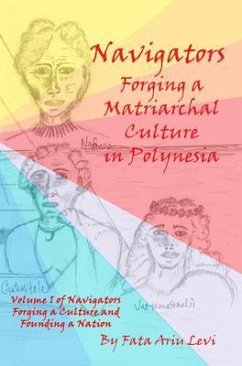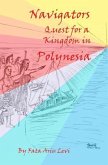Navigators Forging a Matriarchal Culture evidences the women's efforts to cuddle, cradle and nurtured the culture from its early development to a robust praxis which sustained the indigenous Polynesian-Navigators for over 3000 years. The Orator Chief's treatise, here, is a historiography and autobiographical story of the Navigators' cultural development and history. It is historiographical, because the first documented Island histories were made as recently as the 1830s, when the missionaries first arrived in the Archipelago. The biases in these first efforts to chronicle the fragmented, long history of the Navigators are what have compelled this author to take a different, more modern approach, and re-examine the historical events in light of the author's analysis and observation of patterns and relationships.
The culture's praxis consists of customs, procedures, processes, and language-what the author refers to as a system of "protocols," giving the how to and why for in the conduct of customs, norms, or religious rituals, and showing that they are all inter-related in a cohesive culture. Orator Fata Ariu notes that this is a multi-dimensional, multi-disciplinary examination of past events, which leads to a reimagining of current reality with respect to history. This is not a linear process, for the culture functions as a cohesive, tightly-woven mosaic of the Navigators motif. Fata Ariu takes an "aerial viewpoint" of the detailed cultural norms. A geographically spatial (or mapping) fitted within the framework of a family organization's structure. While, simultaneously, incorporating the sciences to derive the essence and profundity of historical events in the Navigators' cultural development. But this is also an autobiographical story-the author is a participant in his research, and thus he uses his more than 40 years of experience as a custodian of the culture, plus his knowledge of historical events, to conduct and orchestrate a reimagining of the history and the cultural development of the Navigators. The author substitutes himself as a participant, in lieu of taking the "arm's length," unobtrusive approach of an academic researcher-a constraint that would be problematic, given that the Orator is a member of the culture he is studying.
This telling of this story aims to satisfy the curiosity of minds inquisitive about cultural development. In so doing, it delineates individual identity and responsibility, and defines the importance of gender rights and leadership, cultural identity, and diversity. More specifically, the author hopes to quench the thirst of the diasporic millions of Samoans across the Pacific, Asia, Europe, and the United States of America. Fata Ariu believes, at a macro level, that understanding a robust cultural identity with diversity is a source of strength for any multicultural national brand; at a micro level, he believes that personal and family identity strengthens the core unit of the culture. Thus, understanding cultural development in the microcosm of this small and far remote Island Nation, as it sustained diversity and sustainability for thousands of years, offers an alternative path for other parallel, more global, giant cultures of the world to find wisdom and a balanced perspective in multicultural and diverse society.
Hinweis: Dieser Artikel kann nur an eine deutsche Lieferadresse ausgeliefert werden.
The culture's praxis consists of customs, procedures, processes, and language-what the author refers to as a system of "protocols," giving the how to and why for in the conduct of customs, norms, or religious rituals, and showing that they are all inter-related in a cohesive culture. Orator Fata Ariu notes that this is a multi-dimensional, multi-disciplinary examination of past events, which leads to a reimagining of current reality with respect to history. This is not a linear process, for the culture functions as a cohesive, tightly-woven mosaic of the Navigators motif. Fata Ariu takes an "aerial viewpoint" of the detailed cultural norms. A geographically spatial (or mapping) fitted within the framework of a family organization's structure. While, simultaneously, incorporating the sciences to derive the essence and profundity of historical events in the Navigators' cultural development. But this is also an autobiographical story-the author is a participant in his research, and thus he uses his more than 40 years of experience as a custodian of the culture, plus his knowledge of historical events, to conduct and orchestrate a reimagining of the history and the cultural development of the Navigators. The author substitutes himself as a participant, in lieu of taking the "arm's length," unobtrusive approach of an academic researcher-a constraint that would be problematic, given that the Orator is a member of the culture he is studying.
This telling of this story aims to satisfy the curiosity of minds inquisitive about cultural development. In so doing, it delineates individual identity and responsibility, and defines the importance of gender rights and leadership, cultural identity, and diversity. More specifically, the author hopes to quench the thirst of the diasporic millions of Samoans across the Pacific, Asia, Europe, and the United States of America. Fata Ariu believes, at a macro level, that understanding a robust cultural identity with diversity is a source of strength for any multicultural national brand; at a micro level, he believes that personal and family identity strengthens the core unit of the culture. Thus, understanding cultural development in the microcosm of this small and far remote Island Nation, as it sustained diversity and sustainability for thousands of years, offers an alternative path for other parallel, more global, giant cultures of the world to find wisdom and a balanced perspective in multicultural and diverse society.
Dieser Download kann aus rechtlichen Gründen nur mit Rechnungsadresse in A, D ausgeliefert werden.
Hinweis: Dieser Artikel kann nur an eine deutsche Lieferadresse ausgeliefert werden.









